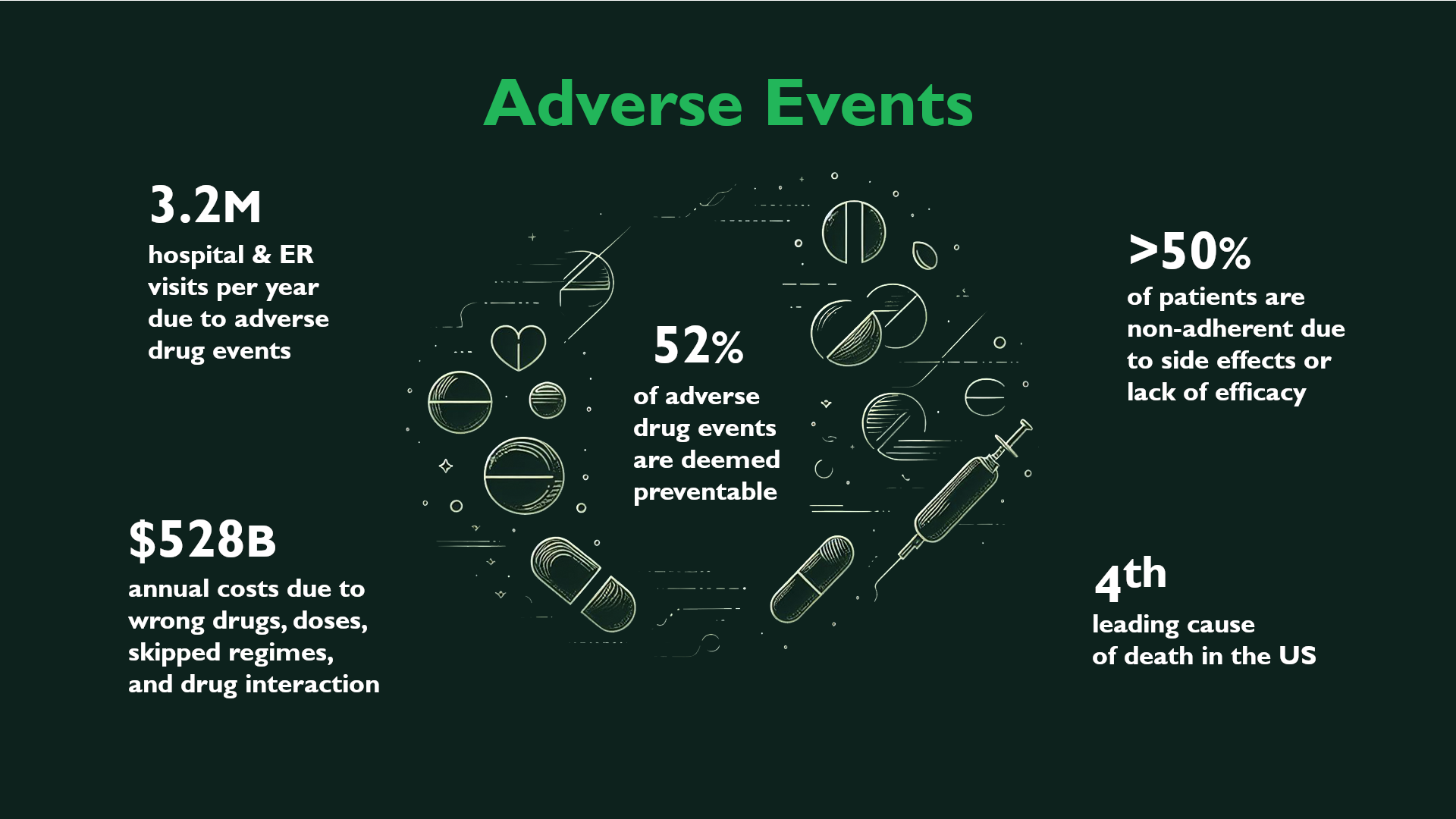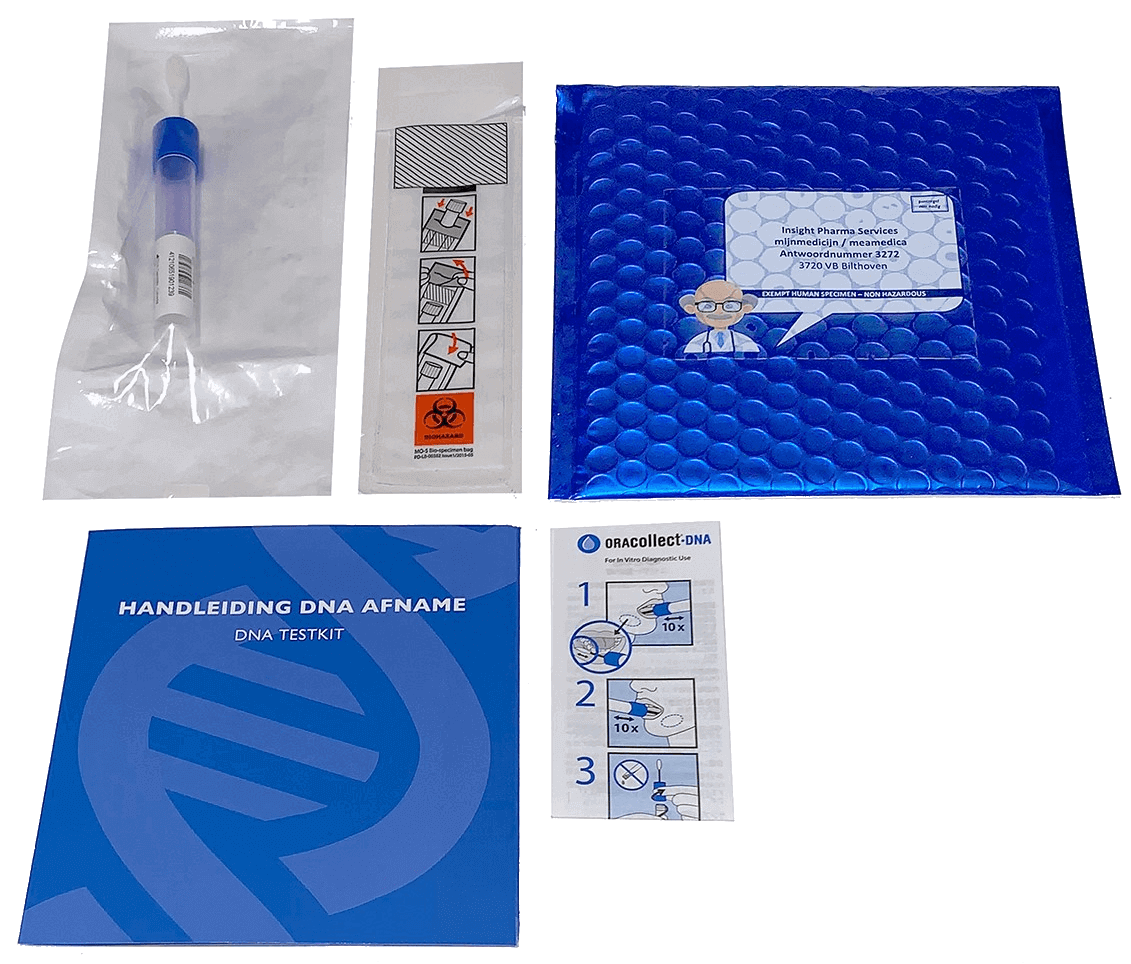
Medication safety through DNA tests and real world experiences.
• Easy collaboration with your healthcare provider(s).
• We do not sell your data: the DNA data is yours!
• Modern technology with modern security for your data!
• One-time test, your DNA does not change.
• We are ready for you and your medical quest!
Get to know yourself through our DNA tests
Unlocking better outcomes through precision health technology.

30% less side effects with DNA testing - Lancet Feb 2023
Your DNA determines how you respond to drugs. Your genes have a huge influence on the way a drug is absorbed, transported through the body and metabolized. DNA can therefore be responsible for the differences in response to a medication. Your genes determine whether your body breaks down a drug too slowly, normally or too quickly, which can result in unpleasant side effects or no effect at all.
A pharmacogenetic test shows the activity of the different enzymes and gives information about how well your body is able to process a drug. This information can help determine what drug to use and in what dose.

Pharmacogenomic testing has the potential to help predict an individual’s genetic response to certain drugs through a saliva test. By using pharmacogenomic testing, health and care professionals will be able to provide more personalised care, rather than prescribing drugs that could have adverse or no effects on the individual. The PREPARE study was the first to prove that adverse drug reactions (or side effects) to commonly used drugs could be reduced by up to 30% if patients are first given a pharmacogenomic test.
Get to know yourself through our DNA tests
Unlocking better outcomes through precision health technology.

On the basis of the ACMG (SF v3.0) guidelines, we found that approximately 1 in 25 Icelanders carried an actionable genotype and that carrying such a genotype was associated with a reduced life span. N Engl J Med 2023; 389:1741-1752
Research has shown that screening for variants in these genes can uncover risks for conditions like familial hypercholesterolemia, certain types of cancers, and cardiovascular diseases. Early detection of such risks allows individuals to take preventive measures or seek early treatment, potentially altering the course of these diseases. These findings underscore the potential life-saving benefits of genetic screening in the context of these genes.
There are many conditions for which a genetic predisposition is known. This link is not equally strong for every condition, but the American College of Medical Genetics has compiled a list of genes in which a variation gives a very high chance of a disorder. These are conditions in which early intervention can contribute to a positive outcome. They call these 'actionable genes', genes for which action is possible.
- heart and vascular diseases;
- familial hypercholesterolaemia;
- various types of colon cancer.
After receiving your order, we will get started with your test kit. Your test kit will be sent by post and will fit in your letterbox. You can see in the image what you will receive.

We only use cells from the cheek mucosa. Just scrape with a cotton swab on the inside of your cheek and you're done. So... no needles and no blood!
It's very simple: our test kit contains a special cotton swab that allows you to easily collect saliva by moving it along the inside of your cheek. You send the cotton swab back to us in the return envelope and we will ensure that the lab gets to work with it.
Via our drug pages you can find out which ones are affected by your DNA. Each drug page has a specific box of whether there is an influence. However, the nature of the influence and which genes are involved are not mentioned. You can find this information in your account under the drugs option. You will find further explanation in your report when you have performed a pharmacogenetic test.
Our pharmacogenetic test checks the following genes: ABCB1, ALDH2, BCHE, COMT, CYP1A2, CYP2B6, CYP2C8, CYP2C9, CYP2C19, CYP2D6, CYP2D6-enhancer, CYP2E1, CYP3A4, CYP3A5, CYP4F2, DPYD, F2, F5, G6PD, GRIK4, HLA-B*1502, IFNL3, MTHFR, OPRM1, SLCO1B1, TPMT, UGT1A1 and VKORC1.
We will send you an email as soon as the data from the lab is received by us.
Within your account all tested data are clearly displayed.
We clearly indicate what the outcome means and what impact this can have for you.
We aim to be able to offer you the results of the lab with 3-4 weeks. When the time comes, you will receive an email from us. Your results will then be visible in your account.
For the DNA analysis we work together with an established and accredited laboratory. This way we can offer a high quality DNA analysis.
You can choose one of the four available payment methods:
- PayPal
- Credit Card
- Bank Transfer
- ApplePay (soon)
Pharmacogenetic testing is reimbursed if a patient has serious side effects or if the drug is unexpectedly ineffective. It certainly makes sense to submit the invoice to your health insurer.
NOTE: despite the medical context, this situation may not be valid for insurers operating in the UK.
That is easy: you do!
You determine what happens to your data. We ensure that this is done in the most reliable and safe way. We can give you more information about your genes if you leave the data with us, but you can also delete them from us. That is your choice, since the data is yours.
No.
The data are yours. And if we run into a research project we would like your cooperation with, to enhance science, we will contact you and ask for your participation. Without your explicit permission, at that moment, nothing happens.
We do our utmost to prevent bad things from happening: we have taken measures to prevent illegal access so that your genetic information is safe with us.
- Fully separated databases keep your genetic information disconnected from your personal (identifiable) information.
- All connections to our website are encrypted using TLS/SSL (Transport Layer Security/Secure Sockets Layer) technology.
- External firewalls limit unauthorized connections to our databases.
The possible results are as follows, per gene:
- PM, poor metabolizer - greatly reduced or no activity
- IM, intermediate metabolizer - reduced activity
- EM, extensive metabolizer - normal activity
- UM, ultrarapid metabolizer - very fast activity